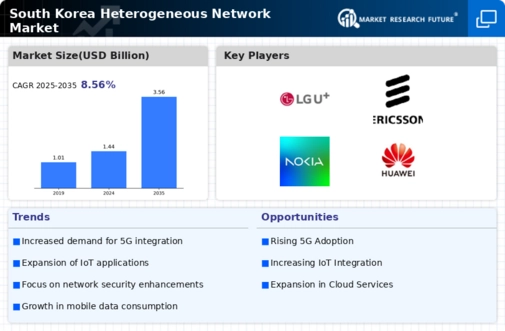Growing Focus on Cybersecurity
As the heterogeneous network market evolves, the emphasis on cybersecurity becomes increasingly critical in South Korea. With the rise in cyber threats and data breaches, organizations are compelled to adopt comprehensive security measures within their network architectures. The heterogeneous network market is responding to this need by integrating advanced security protocols and solutions into their offerings. Recent statistics indicate that cybercrime costs South Korean businesses approximately $1.2 billion annually, underscoring the urgency for robust cybersecurity measures. This growing focus on security not only protects sensitive data but also enhances consumer trust, which is vital for the continued growth of the heterogeneous network market. Consequently, companies that prioritize cybersecurity within their network solutions are likely to gain a competitive edge in this dynamic market.
Emergence of Edge Computing Solutions
The emergence of edge computing solutions plays a pivotal role in shaping the heterogeneous network market in South Korea. As data generation continues to accelerate, the need for processing data closer to the source becomes increasingly apparent. Edge computing reduces latency and enhances the performance of applications, making it a vital component of heterogeneous networks. The market is witnessing a growing adoption of edge computing technologies, particularly in sectors such as manufacturing, healthcare, and transportation. According to industry forecasts, the edge computing market in South Korea is expected to reach $1.5 billion by 2027, indicating a robust growth trajectory. This trend suggests that the heterogeneous network market will likely benefit from the integration of edge computing solutions, as organizations seek to optimize their operations and improve service delivery.
Advancements in Network Infrastructure
Technological advancements in network infrastructure significantly impact the heterogeneous network market in South Korea. The ongoing evolution of networking technologies, such as software-defined networking (SDN) and network function virtualization (NFV), facilitates the deployment of heterogeneous networks. These innovations allow for greater flexibility and scalability, enabling service providers to optimize their networks for diverse applications. The South Korean government has invested heavily in upgrading its telecommunications infrastructure, with plans to allocate approximately $2 billion towards enhancing network capabilities by 2027. This investment is likely to stimulate growth in the heterogeneous network market, as it encourages the adoption of advanced networking solutions that can accommodate the increasing data traffic and connectivity demands of both businesses and consumers.
Rising Demand for Enhanced Connectivity
The heterogeneous network market in South Korea experiences a notable surge in demand for enhanced connectivity solutions. As businesses and consumers increasingly rely on seamless internet access, the need for diverse network architectures becomes apparent. This demand is driven by the proliferation of smart devices and applications that require robust connectivity. According to recent data, the number of connected devices in South Korea is projected to reach over 100 million by 2026, indicating a substantial market opportunity. The heterogeneous network market is poised to benefit from this trend, as it enables the integration of various network technologies to meet the growing connectivity requirements. Furthermore, the increasing reliance on cloud services and data-intensive applications further fuels this demand, suggesting a promising outlook for the industry in the coming years.
Increased Investment in Smart City Initiatives
The push towards smart city initiatives in South Korea significantly influences the heterogeneous network market. As urban areas evolve into smart cities, the demand for interconnected systems and services rises. This transformation necessitates the deployment of heterogeneous networks that can support various applications, including traffic management, public safety, and environmental monitoring. The South Korean government has committed to investing over $10 billion in smart city projects by 2025, which is expected to drive growth in the heterogeneous network market. The integration of diverse technologies within these networks enables efficient data sharing and communication, ultimately enhancing the quality of urban life. As cities become smarter, the heterogeneous network market is likely to expand, presenting opportunities for innovation and collaboration among stakeholders.















Leave a Comment